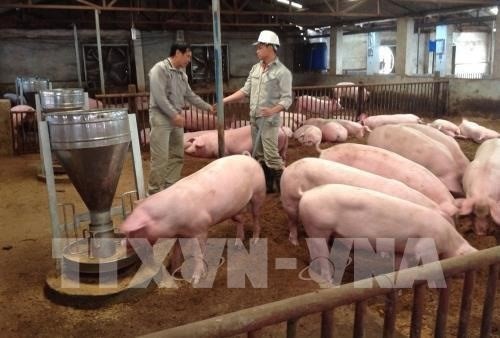
Project helps improve pork safety in Vietnam
Latest
 |
| Project helps improve pork safety in Vietnam: Illustrative image (Photo: VNA) |
SafePORK (2017-2023) is a project funded by the Australian Centre for International Agricultural Research (ACIAR) and co-implemented by the International Livestock Research Institute (ILRI), the Vietnam National University of Agriculture (VNUA), the Hanoi University of Public Health (HUPH), National Institute of Animal Sciences (NIAS) and University of Sydney.
“We are working with other programmes, such as One Health Initiative, to scale out this positive research outcome for the benefit of more people in other localities in Vietnam,” said Nguyen Viet Hung, co-leader of the ILRI’s Animal-Human Health Program and leader of the ACIAR’s One Health Initiative.
In the agreement between ACIAR and the Ministry of Agriculture and Rural Development of Vietnam for 2017-2027, food safety was identified as one of six priorities.
“Projects like SafePORK can provide policymakers and the public with scientific evidence that leads to actionable policy options to better manage food safety in the country,” said Dr Anna Okello, research programme manager for ACIAR livestock systems.
SafePORK seeks to reduce the burden of foodborne diseases in informal, emerging and niche markets.
It developed and evaluated simple interventions for improving food safety while safeguarding livelihoods in the Vietnam pork sector.
At the workshop, the SafePORK team shared key findings and cost-effective and practical interventions to make pork safer along the smallholder pork value chain.
The interventions targeting traditional retail were effective in reducing microbial contamination in pork.
“The SafePORK team implemented simple interventions and developed the capacity to reduce the key pathogen of Salmonella,” said Fred Unger, the regional representative at ILRI in East and Southeast Asia.
“After the intervention, the prevalence of Salmonella on retailed pork has been decreased from 52% to 24%,” said Unger.
The team conducted surveys with pork smallholder value chain actors.
Seven key reasons were identified as the leading cause of unsafe pork: poor hygiene, improper preservation and processing techniques, long meat transportation duration, disease, unclear pork origin, and low-quality inputs.
The research team introduced an intervention package to improve hygienic practices. The package includes separating ready-to-eat pork, raw pork and intestines; and frequently washing surfaces, equipment and vendors’ hands.
An intervention package was also introduced at slaughterhouses.
This includes using stainless-steel grids to prevent carcasses from contacting the floor, frequent washing of hands and surfaces, and better separating clean and dirty zones to reduce carcass contamination further.
At the workshop, Shirley Tarawali, director general of ILRI, said that SafePORK's research and interventions had contributed significantly towards safer pork in Vietnam while supporting many livelihoods.
These lessons and valuable insights will help achieve safer food systems for the country, and beyond, he added.

















